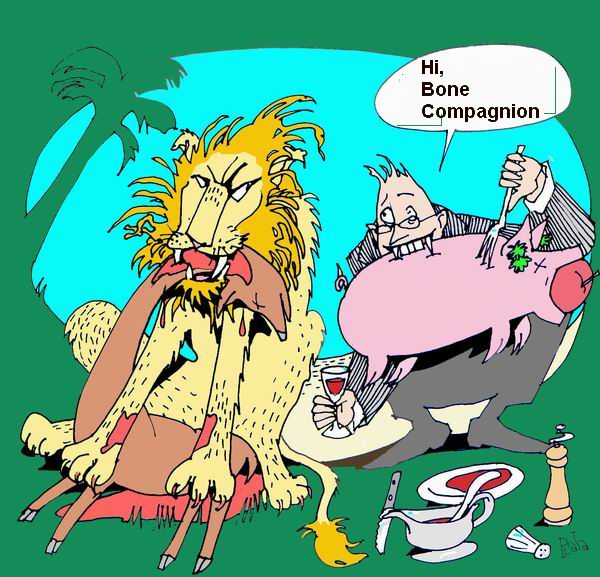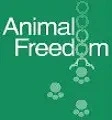Is it right to eat animals? |
Even if it is allowed, it is better not to do it
Based upon freedom as a basic right for man and animal, it is man's moral obligation to respect the freedom of others. Does (not) eating meat belong to this moral obligation? The vegan, who wants to make use of animals as little as possible, will certainly assent to this. There is a fair chance that the vegetarian too will agree, although amongst them there are also people who don't eat meat for health reasons and to whom an objection such as the slaughter of animals is irrelevant.
Subjects in this article
- Not eating meat is increasingly becoming common.
- Is it healthier to eat less meat?
- Is it better than to eat wildlife?
- Is eating fish better than eating meat?
The group of people who eat meat, can be split into two parts: those who eat meat from industrial farming and those who eat biologically produced meat, from f.e. local butchers or otherwise. That people who eat meat from industrial farming turn aside from their duty, is something we want to make quite clear on Animal Freedom: we think a moral border is being crossed here. The origin and the foundation of this moral border are substantiated by our article on freedom as a basic right for animals. Due to industrial farming premature exhaustion takes place of the earth, the environment, human health and animal welfare.
Whether or not people who eat biologically produced meat or comparable meat products cross a moral border, depends on the way you look upon people's right to yes or no be allowed to kill animals. These meat consumers will defend themselves by bringing forward that, before its death, the animal was given the chance to live an animal-worthy life. With that however, man has not yet obtained the right to be allowed to kill animals. |
The moral dilemma of eating meat
He or she who eats meat can (apart from liking its taste) only argue that meat is an easy and nourishing food article. Possibly they may add that in free nature certain animals too eat other animals. These animals don't have other choices, man does and for that reason bears responsibility for his choice of food. When someone tackles them on eating meat produced in factory farming, then the weak defense-argument that they themselves are free to determine whether or not they eat meat, is not sufficient: after all they crossed a moral border…
The death of the animal also cannot be seen as a rescue from suffering. To slaughter animals is being done for the sake of the pleasure man takes in eating meat. It is not a great motive that deserves admiration. In particular if you consider the right to live to belong to the right to freedom, you cannot avoid the conclusion that killing animals (for the pleasure of eating tasty) means a violation of their basic rights.
People who think they cannot afford to be held responsible for the killing of animals for food, better avoid this dilemma by stopping their meat consumption. Much can be said for a menu without meat: weighing between conscience, health, taste and costs, inevitably points towards favoring to skip meat from one's menu. |
Not eating meat is increasingly becoming common
Vegetarians obviously live só healthy that a British insurance company offers them cheaper premiums.
In recent years everyone could become aware of the scandals in the meat producing industry: dioxin, hormones, swine fever and BSE. These scandals point towards people's indifference where the fate of animals is concerned. How can it be morally defended to eat meat from animals that come from industrial farming? It can't be defended, the meat consumer only shrugs his shoulders, unconcerned.
We consider it to be a matter of civilization to organize your life in such manner that you respect the liberty of all living creatures. An animal deserves a better life than just, before death arrives, the waiting-room that we call "industrial farming".
Is it healthier to eat less meat?
What, after all, can be against skipping meat from your menu more often? That vegetarian food can be quite nice and tasty, is common knowledge by now.
In order to stay in good health, an equal balance between animal proteins and vegetable proteins is better than the average nowadays balance, which means twice as many animal proteins than vegetable ones.
Heavy consumption of hot dogs, sausages and other processed meats could raise the risk of pancreatic cancer, scientists heard yesterday at the annual meeting of the US cancer association. |
Is it better than to eat wildlife?
It is naive to think all wildlife in restaurants comes from nature. Deer are kept by deer-breeders. The website of the Dutch Society for the Animal Protection states: "Many people put wildlife on their menu for Christmas. However, in many cases the wild is far from being as wild as the name suggests. Deer f.e.: the number of animals being shot in Holland on an annual basis, which averages some 450 of them, is by far not enough to meet the demand for deer-meat. For that reason they are being commercially bred and deer-meat is being imported from Belgium, Great Britain and New Zealand. Fair chance therefore that the "wild animal" on your dish did not originate from wildlife. Then add to this knowledge that deer are in no way suited to be kept in captivity, and consequently ask yourself once more if deer indeed has to be on your menu at all." So far the Society for the Animal Protection. In respect of wild swine, something similar applies: many of them are kept on special farms in Poland.
Rabbits and pheasants are kept in cages, pheasants are set free for a very short period and, totally defenseless, cracked down under the mask of "pleasure hunt". Hares come from Argentina and seem to be shot being younger and younger, due to the increased demand.
Is eating fish better than eating meat?
One could still reason: fish live freely in the sea, so before being cought they had a good life.
Well, the sea is becoming ever so empty, the North Sea already contains only half of the quantities of fish it used to do. Salmons, eel and trout are being bred in large tanks, as if in factory farming, including the application of antibiotics. Many of the fish cought in the seas are being fed to these animals.
Because closer to where they live less and less fish can be cought and trawlers got bigger and less dependent on their home port, the fishermen tend to sail much further to make their catch. Along Africa's coasts for example, European fishermen, by using their enormous trawl-nets, steal away the fish from African fishermen. Apart from this kind of depriving people of their livelihood, moreover the bottom of the sea as well as its ecology becomes totally ruined that way.
For a review on abuses in the fishing industry, click here. Therefore fish too is not always a proper alternative for meat. Click here to read more about considerations and weighs regarding living with a clear conscience. |
 |
|
|
|
|
| |

